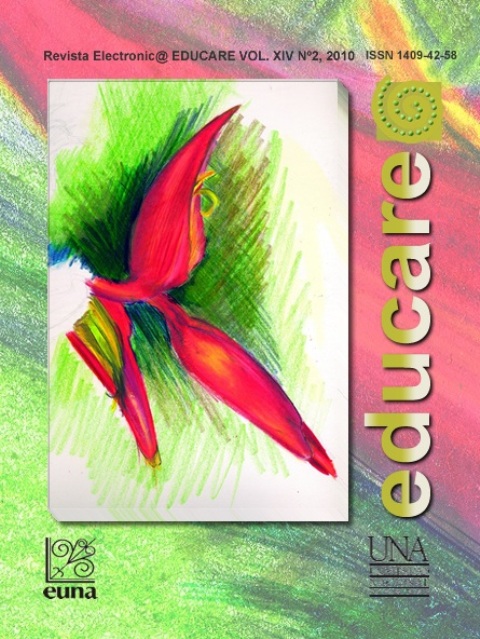Skills in the XXI Century Guidance: An Approach to the Costa Rican Reality
DOI:
https://doi.org/10.15359/ree.14-2.13Keywords:
competences, educational and vocational counseling, genetic and specific competences, educationAbstract
During a long time, the term competence has been used in different fields. Among those fields, and one of the most important, we can mention the educational system, from preschool to university levels. The term has to be understood as one person integral behavior, making him/her able to enter the labor force in the most competitive way.
Within the university realm, experts have tried to include the model of competences as a transversal axle into the teaching-learning process. In European universities, such model has been implemented in most of them. In Latin America universities, on the other hand, it has been used in a good number of countries.
The importance of early detection of competences among target populations in education has been widely discussed. However, it has been highlighted the necessity of considering romantic or subjective competences, which seem to lack of value in this complex and competitive actual world.
The term competence has been classified as genetic competence, or common and specific competence. The latter is related to the knowledge scope. Within the counseling field, specifically, the general and specific competences are deemed highly appropriate for good a work performance.
This article focuses on the main antecedents of competences and analyzes this approach from counseling field perspective. In regards to this specific aspect, a survey with professionals in counseling was carried out. Such a survey ends up dealing with some of the competences considered unavoidable for an accurate performance of professionals in counseling. It is important to mention that the competences of the survey mainly point out to genetic competences rather than to specific competences.
References
Abdón, I. (2003). Aprendizaje y Desarrollo de Competencias. Colombia: Cooperativa Editorial
Magisterio.
Benitone, P., Esquetini, C., González, J., Maletá, M. M., Siufi, G., Wagenaar, R. [Eds.] (2007).
Reflexiones y Perspectivas de la Educación Superior en América Latina. Informe Final
–Proyecto Tuning– América Latina 2004-2007. España: Publicaciones de la Universidad de
Deusto.
Delors, J. (1996). La educación encierra un tesoro. Informe a la UNESCO de la Comisión
Internacional sobre la Educación para el Siglo XXI. París: Ediciones UNESCO. Recuperado
de http://www.unesco.org/education/pdf/DELORS_S.PDF
Gardner, H. (1998). Inteligencias múltiples. La teoría en la práctica. Barcelona, Paidós.
González, J. y Wagenaar [Ed.]. (2008). Universities´ contribution to the Bologna Process. An introduction:
Universidad de Deusto (2a
ed.). España: Universidad deDeusto. Recuperado de http://
tuning.unideusto.org/tuningeu/
Ministros Europeos de Educación. (1999, Junio, 19). Declaración conjunta de los Ministros Europeos
de Educación reunidos en Bolonia. Bolonia.
Ministros de Educación Superior. (2007). Comunicado de Londres. Hacia el Espacio Europeo de
Educación Superior: respondiendo a los retos de un mundo globalizado. Recuperado de
http://www.crue.org/export/sites/Crue/procbolonia/documentos/antecedentes/Comunicado_
de_Londres_2007.pdf
Ministros Europeos en Funciones de la Educación Superior. (2001). Declaración de Praga, 2001.
Hacia el Área de la Educación Superior Europea. Recuperado el 1 de diciembre, 2010,
en http://www.ond.vlaanderen.be/hogeronderwijs/bologna/links/language/2001_Prague_
Communique_Spanish.pdf
Ministros Europeos de Educación Superior. (2003). Proceso de Bolonia. Realizando el Espacio
Europeo de Educación Superior. Comunicado oficial de la Conferencia de Ministros
responsables de Educación Superior, en Berlín. Berlín. Recuperado de http://www.
google.co.cr/url?sa=t&source=web&cd=6&ved=0CDoQFjAF&url=http%3A%2F%2Fww
w.uco.es%2Forganizacion%2Feees%2Fdocumentos%2Fnormas-documentos%2Fdoc-basi
ca%2FComunicado%2520de%2520Berlin%25202003.pdf&rct=j&q=Ministros%20de%20
Educaci%C3%B3n%20Superior%2C%202003%2BBerl%C3%ADn&ei=pr3-TJrkFY76sAOqdyvCw&usg=AFQjCNEsXcK47X_tCttSidBG8H0u_PYsAg&cad=rja
Ministros Europeos de Educación Superior. (2009). El Proceso de Bolonia 2020 . El Espacio
Europeo de Educación Superior en la nueva década. Comunicado de la Conferencia de
Ministros europeos responsables de educación superior, Lovaina. Recuperado el 1 de
diciembre, 2010 de: http://www.crue.org/export/sites/Crue/procbolonia/documentos/antecedentes/Comunicado_Lovaina_Ministerio_es.pdf
Ministros representantes de Francia, Alemania, Italia y el Reino Unido. (1998). Declaración de la
Sorbona. Recuperado de http://www.eees.ua.es/documentos/declaracion_sorbona.htm
Profesional de la Orientación Educativa y Profesional [AIOEP]. (2008). Competencias Internacionales
para los Profesionales de Orientación de Educación. Berna. Recuperado el 3 de abril de
, de http://www.iaevg.org/iaevg/nav.cfm?lang=4&menu=1&submenu=5
Ruiz, N C. (2002). Desarrollo de Potencialidades y Competencias. Colombia: Editorial
PROLIBROS.
Tobón, S. (2006). Competencias en la Educación Superior. Colombia: Ecoe Ediciones.
Tobón, S. (2010). Memorias. Mejora e innovación de la docencia, la investigación y la extensión
en la educación superior desde el modelo de las competencias. (Material de apoyo a conferencia
de CONARE.). Centro de Información en Formación y Evaluación. San José, Costa
Rica: s. e.
Universidad Católica de Temuco (2005). Competencias Genéricas UC Temuco: Para la Formación
Integral de Ciudadanos Socialmente Responsables. Temuco, Chile: Autor.
Downloads
Published
How to Cite
Issue
Section
License
1. In case the submitted paper is accepted for publication, the author(s) FREELY, COSTLESS, EXCLUSIVELY AND FOR AN INDEFINITE TERM transfer copyrights and patrimonial rights to Universidad Nacional (UNA, Costa Rica). For more details check the Originality Statement and Copyright Transfer Agreement
2. REUTILIZATION RIGHTS: UNA authorizes authors to use, for any purpose (among them selfarchiving or autoarchiving) and to publish in the Internet in any electronic site, the paper´'s final version, both approved and published (post print), as long as it is done with a non commercial purpose, does not generate derivates without previous consentment and recognizes both publisher's name and authorship.
3. The submission and possible publication of the paper in the Educare Electronic Journal is ruled by the Journal’s editorial policies, the institutional rules of Universidad Nacional and the laws of the Republic of Costa Rica. Additionally, any possible difference of opinion or future dispute shall be settled in accordance with the mechanisms of Alternative Dispute Resolution and the Costa Rican Jurisdiction.
4. In all cases, it is understood that the opinions issued are those of the authors and do not necessarily reflect the position and opinion of Educare, CIDE or Universidad Nacional, Costa Rica. It is also understood that, in the exercise of academic freedom, the authors have carried out a rogorous scientific-academic process of research, reflection and argumentation thar lays within the thematic scope of interest of the Journal.
5. The papers published by Educare Electronic Journal use a Creative Commons License:















 The articles published by Educare Electronic Journal can be shared with a Creative Commons License:
The articles published by Educare Electronic Journal can be shared with a Creative Commons License: 



